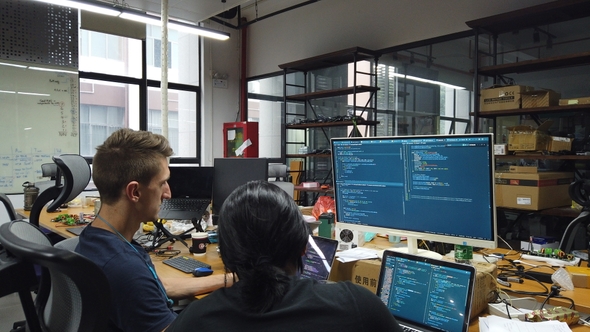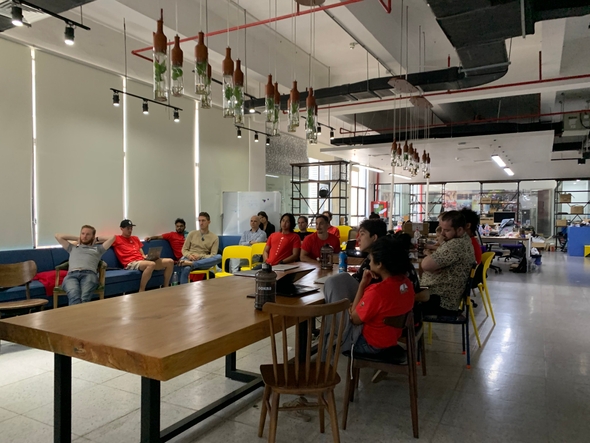The challenges and rewards of working in a startup company
Last Updated Sat Jan 07, 2023
When I say startups, you might think about bean bag chairs, ping-pong tables, free gym membership, and free food (we never had a bean bag chair, but we had a weird wooden chair that would make you sit straight). It’s cool and all, but that’s only the tip of the iceberg!
Aside from the perks and freebies, there are a lot of cool, crazy, chaotic, daunting, and fun things you’ll experience working for a startup. I have been working for a startup company (Okra Solar) for over four years. It’s different from all the big companies I worked for. If I had known there were such things as startups earlier in my career, I would have chosen to work for one instead. But I’m getting ahead of myself.
This article is a collection of the challenges I faced and the rewards I reaped while working for a startup like Okra. Are you ready? Let’s start it up!
🏠 What is a startup company?
A startup is a company in the early stages of its development. It typically has less than 30 employees (we were only about 20 people working at Okra when I joined).
It usually is solving a problem. It has a vision. In it’s own way, it’s changing the world for the better. At Okra Solar, we are solving an energy problem. We are on a journey to eradicate energy poverty by ensuring everyone has access to electricity. Airbnb, Uber, and Netflix were all startups once, and they also are solving a specific problem.
Startup is also all about growth and innovation. Startups are not afraid to do something new, something different, that’s why they are called “disruptors”.
🏋️♂️ The Challenges
Working for a startup is not for the faint of heart. Working on something new and different can be messy and daunting. It will push you to your limits and challenge your curiosity and creativity. It will require a bucketful of patience and coffee. But who doesn’t love a challenge?
🤠 Multiple hats
Working for a startup means you will work on smaller teams. There aren’t enough people to do all the work, meaning you need to do other things besides what you signed up for.
In the software team, we create and deploy various applications and tools for our internal and external users. We don’t have a dedicated team of testers, so we both write different automated tests for them and test them manually too. We also monitor and maintain all software related stuff which is usually done by a separate support team. There would also be times where we need to do random presentations of Okra’s tech suite. I dread doing presentations since I have stage fright but it’s good to face your fears!
Expect to do tasks that multiple teams in a large company will typically do.
🤹🏼 Self-management
The team leader of the software team is also the CTO. Throughout the day, he writes and reviews code, attends meetings, and designs the next feature on our pipeline. He doesn’t have time to check up on me and my work every minute of every hour, especially now that we are all working from home.
Therefore, I am expected to finish the work I have given within the time we have estimated for it to be completed, to ask questions when I have something I don’t know, and to reach out to my colleagues whenever I am blocked. Everyone in our team has a role to play, and we are expected to do it regardless if no one else is looking. In a startup, you need to be accountable for your work and the time you put into it.
⏰ Long hours
As much as possible, our team discourages working over 9 hours. We meticulously groom (list out all the things needed for the task to be completed) our tasks and put conservative estimates on them. But there are times when we need to complete a feature on a tight deadline, you don’t have enough knowledge and experience with your task, or you need to deploy the latest version at a weird time. These scenarios may require you to work longer hours.
I was once assigned to make our web-based mobile app work offline since our users will likely be in areas with weak or no signal. I had no experience in this area, and the documentation and tutorials were scarce. But I did what ought to be done and spent time learning and experimenting. It took a lot of time to understand and make it work, but it was all worth it in the end (the feature significantly improved user experience!).
❓ Endless unknowns
If you encounter an issue in a well-established company, there will likely be documentation for that or a point person whom you can ask for help. In the startup world, that documentation or point person might not exist.
You might hit a wall and find that no one can help you. So, you need to be resourceful or creative to overcome any blocker you encounter while completing a task.
I’ve hit a wall before where I can’t find a reliable library to help us scan barcodes using our mobile app. It’s also an additional challenge that our users have phones with different camera quality. I solved the issue by providing an option to type the barcode number manually.
You must be unrelenting and innovative. Always remember that Google Search is your friend.
🥇 The Rewards

You might feel scared now that you know the challenges you will face when working for a startup, but as they say, you will reap what you sow.
📈 Exponential Growth
Since you are likely to wear multiple hats every day of every week, you will surely experience a technical growth spurt. You will learn more compared to working for a dedicated team of a bigger company.
I was hired as a Python developer, but a few months in, I was assigned to start our web-based desktop application. I didn’t even know how to write in JavaScript, let alone use TypeScript! I was later assigned to do the bulk of the features of our web-based mobile app, which means learning everything about PWAs and making it work offline. Then the next quarter, I am learning to create abstractions and do dependency injections to create new endpoints for our web-based apps to consume (road to full-stack development)!
It may be daunting at first, but you’ll come out of that tunnel bagging a ton of new knowledge and experience you might not get working for a big corporation.
🎨 Creative Freedom
I once worked in a company where if you want to change something, even just a column in a database, you will need approval from at least three people above you. It will take days, even weeks, to get that approval. Bureaucracy is never a thing in startups! Getting approval can just mean tapping someone in the back or sending a message in Slack!
Since startups are generally in the research and development phase, you’ll likely have a chance to work on something that still needs to be built. It can be anything, from a new script to a web page or even an entire application. I remember creating our email notification service to send email reports to external users. I was given (along with the guidance of our team leader) the freedom to design the system architecture, decide what libraries to use, and write all the code needed to send these reports. Designing and creating something on your own is always a great learning experience.
😎 Meet and work with talented and driven individuals
Have you ever watched a talent show and been wowed by how amazing that person is on TV? You might experience that in real life when working in a startup. Since startups can only hire a handful of people, there’s a big chance you’ll get to work with some of the brightest minds you’ll ever meet.
You will learn something new daily, even outside work, especially during lunch! I learned more about history during team lunch than in my classes during high school (back when we were working together in an office in Cambodia). I learned about the wonders of intermittent fasting (and how fish oil will break your fast). I also learned the secret to being super productive from our CEO, organize your day using Google calendar and write your ideas in a journal (totally works)!
When you are in a company full of hustlers, no matter how lazy you are, sooner or later, you will see yourself hustling with them.
🚀 Impactful Work
It’s one thing to say that your company is making the world a better place, and it’s a totally different thing to see it with your own eyes! I had a chance to go to one of the islands (Busuanga island in Palawan) we have electrified in the Philippines. I saw how we made their lives better. Children can now study better by using smartphones and computers. Fishermen can store more fish for a longer period because of their freezers. Mothers can now watch tv for entertainment and news as compared to just using the radio! Providing electricity is providing equal opportunity to everyone.
As I’ve said earlier, a startup tries to solve a specific problem to improve the lives of its users. Joining a startup is a chance for you to not just earn money but also make a difference.
🤓 Conclusion
I know that the startup life is not for everyone. There a lot of things to consider. Do you thrive well in the face of pressure? Are you a person who takes initiative? Are you ready to be accountable when things go wrong rather than doing the blame game? Are you willing to forego partying and weekend trips if the need arise?
Surely, you will be working outside your comfort zone but also remember that is the place where growth occurs. There’s a lot of hard work but working for a startup might provide the most meaningful, exciting, and rewarding time of your career.
It’s no wonder why Okra have been the company I worked for the longest. In my honest opinion, the rewards and benefits that you’ll gain for working at a startup outweights the challenges and risks. I hope the experiences I’ve shared shed some light about the things you can expect while working for a startup!


Comments